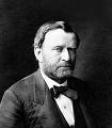 Ulysses Simpson Grant (27 April 1822 – 23 July 1885) was an American general who became the 18th President of the United States (1869 – 1877) following his success as military commander in the American Civil War.
Ulysses Simpson Grant (27 April 1822 – 23 July 1885) was an American general who became the 18th President of the United States (1869 – 1877) following his success as military commander in the American Civil War.
Ulysses S. Grant was a supporter of many homeopaths, and in turn he received backing from them, sometimes at personal cost. Grant appointed homeopath Tullio Suzzara Verdi, who had already been supported by President Abraham Lincoln, to the District of Columbia Bureau of Health in 1871.
Many homeopathic medics and homeopathic nurses served in the Union army under Grant, alongside abolitionists, all fighting to support the rights enshrined in the Declaration of Independence. Two of these were nurse and hospital administrator Mary Ann Bickerdyke, who had trained as a homeopath, and Dr. Mary Jane Safford.
Grant was also petitioned by homeopathic feminists fighting for women’s wrights. These included Victoria Woodhull, civil rights activist and homeopathic supporter Elizabeth Cady Stanton, and Susan B. Anthony, who was arrested for voting for Grant in 1872.
In 1864, Grant enabled homeopathic physician General Edward Wild to continue his work as a recruiter of black troops into the army in the Civil War, despite the constant persecution, Wild suffered in this role. Wild continued his work after the war with the Freedmen’s Bureau.
Grant’s cordial relationship with proponents of homeopathy continued to the end of his life. His memoirs were published by Mark Twain, himself a firm advocate of homeopathy:
There is no more pathetic story than that of Grant, though dying of cancer of the throat, manfully completing his Personal Memoirs of the Civil War, in order to provide for his family. He finished just a few weeks before his death. Published by Mark Twain‘s firm, the two volumes eventually brought the Grant family $450,000.


Leave A Comment